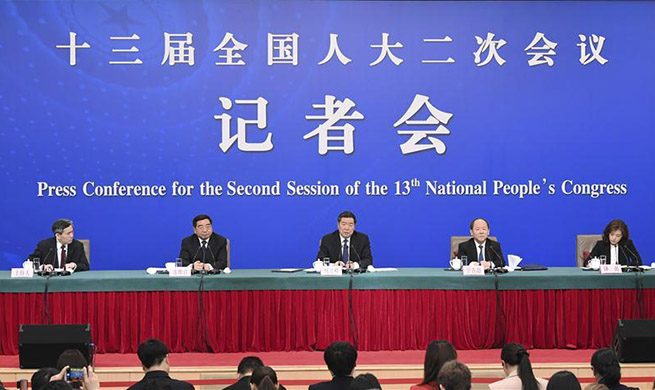BERLIN, March 6 (Xinhua) -- The German government could incur costs of up to 36 billion euros (40.7 billion U.S. dollars) if it misses European Union (EU) targets for greenhouse gas emissions reduction in the transport sector, according to a study conducted on behalf of Greenpeace and published here on Wednesday.
The Cologne-based NewClimate Institute, which conducted the study, examined the potential costs if the German government failed to reduce carbon dioxide (CO2) emissions from transport by around 42 percent by 2030 compared with 1990 levels.
The study calculated the number of emission allowances Germany would have to buy from other EU member states in order to compensate for failing to meet CO2 reduction targets for transport.
Depending on the actual cut in transport emissions and the future price of CO2 certificates, the German government could incur costs anywhere between 3 billion euros and 36 billion euros by 2030, according to the study.
"Without significantly more climate protection in transport, the German government is heading for costs running into the billions, which will be lacking elsewhere in the budget," said Niklas Hoehne of the NewClimate Institute, the author of the study.
In its most recent projection, the German government assumed that in 2030, using current measures, Germany's CO2 emissions from transport would be only about 9 percent below the 1990 level.
"Germany must take drastic steps to catch up on its climate policy deficit in the transport sector," commented Greenpeace transport expert Tobias Austrup.
Car traffic alone accounted for 115 million tons out of approximately 900 million tons of Germany's CO2 emissions, according to the German Federal Motor Transport Authority (KBA). KBA figures show that there were 65 million newly registered vehicles in Germany last year.
Utilities and large industries in the European Union are part of the EU Emissions Trading Scheme (ETS), which allocates greenhouse gas allowances and facilitates trade in emissions certificates in order to meet sectoral limits.
The transport, building and agriculture sectors are not covered by the EU ETS but have their own binding reduction targets. Germany has committed to reduce its non-ETS emissions by 38 percent between 2005 and 2030.
Last year, the German government set up a working group to discuss how Germany could meet its EU commitments to reduce CO2 emissions in the transport sector.













